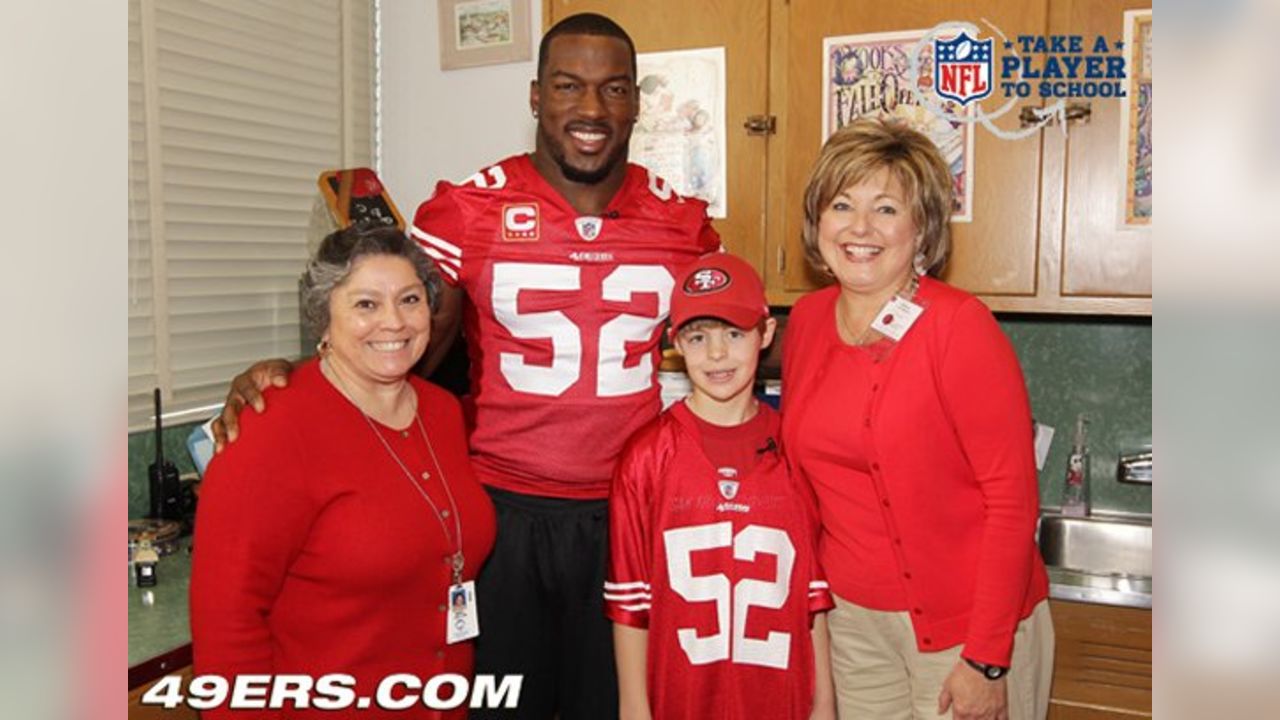The strange and impromptu family reunion took place Wednesday on a high school basketball court.
There was Ernest Willis, a 50-year-old black man with a face worn from a lifelong battle with optimism. On his pickup basketball team was Orey Willis, 25, the second of his eight children and a younger brother to Patrick Willis, the star linebacker for the San Francisco 49ers.

And on the sideline with a whistle dangling from his lips was the Central High basketball coach, a 35-year-old white man named Chris Finley. Ten years ago, he became a foster father to Patrick and Orey Willis, and two of their younger siblings, after the authorities went to the family’s home and took them away from Ernest, a struggling, abusive single father.

Patrick Willis calls both of them Dad. And there they were, thousands of miles from San Francisco, sharing a basketball court and a few laughs.
“It’s getting better and better and better,” Ernest Willis said. “It all worked out. We ain’t got no problem.”
Theirs is a story more winding than the back roads of western Tennessee, more complicated than anything Patrick Willis will face Sunday against the Giants in the N.F.C. championship game.

Ernest Willis plans to watch his son on television, inside one of the dozens of tired trailers hidden in the wooded hills of Smyrna, the black community outside town where his parents grew up, and where he grew up, and where the youngest of his children continue to grow up.
Chris Finley plans to attend the game in California and stay in Patrick Willis’s suburban mansion. Finley’s wife, Julie, and their two young children have been there since last week.
“My mom is spoiling me with these home cook meals the past few days,” Willis wrote in a Twitter message Tuesday. He attached a photograph of a plate of beans and rice atop a marble countertop.

The hard part is explaining how Patrick Willis got from here to there with the help of two very different fathers, whose worlds intersected at the crossroads of a promising boy’s life.
Ernest Willis is a tightly wound man, a fit 5 feet 8 ½ inches tall, who played on some of Central High’s best basketball teams a generation ago. He has had an assortment of odd jobs and a stint in the National Guard, but has not worked the past two years. He talks fast, and his thick accent turns bunches of syllables into single long ones.
“I was by myself,” he said of his years as a single father after the children’s mother left the family when Patrick was 4. “My mama helped me out, but I raised them myself.”
His mother, Mary Louise Willis-Blankenship — Miss Louise to everyone in the neighborhood — lived in a trailer about 50 yards away. She used to pull 400 pounds of cotton a day in nearby fields and earn $20 or $30 for her work.
Image
Now 76, she brags of 12 children, 38 grandchildren and 28 great-grandchildren. The walls of her house, a double-wide, four-bedroom trailer purchased a few years ago by Patrick, are covered in family photographs. There is a framed Pro Bowl jersey of Patrick’s that he signed, “To Grandma, I love you so much, thank you.”
On Wednesday evening, her home was a hive of cross-generational activity. “I’m like the old woman in the shoe,” she said.
She also said she did not know much about the drugs and alcohol that Ernest Willis was using as he raised four children nearby. She did not think much about how he disciplined them.
“They’d come over here and complain about their father,” she said. “I’d say, ‘Y’all going to have to manage, because I got whooping on top of whooping because I never wanted to chop cotton.’ ”
When Patrick was 17, however, he had had enough. He was a polite, deferential type, a hard-working student who studied in the locker room before basketball games and brought a flashlight on the team bus so he could read on the way home.
He grew old enough to understand that his father was using drugs. He grew strong enough to stand up to his father when he saw him striking his younger sister, Ernicka. And after he stopped one particularly nasty episode during a family basketball game, he told school counselors what was happening at home.
“A friend at Child Protective Services called me,” said Rod Sturdivant, the director of schools in Bruceton and Patrick Willis’s high school football coach. “She said, ‘Rod, we’re fixing to come get the Willis kids and take them to Haywood County.’ ”
Image
Not yet, Sturdivant told her. He wanted Willis to play his senior year of football at Central.
Sturdivant turned to Finley, a math teacher and the boys basketball coach. He was 25 and had been married a year. He and Julie had a four-bedroom trailer.
“My first reaction was, ‘This is a no-brainer,’ ” Finley said, adding that he initially considered it a temporary arrangement.
Officials went to the Willis home to get the children. The four children filled the Finley trailer miles away.
By the end of the summer of 2002, the Finleys realized they could not handle all four Willis children and keep their marriage intact. Patrick and Orey stayed with them. Ernicka and another brother, Detris, moved back to Smyrna, to live with another foster family, then bounced between homes.
Detris drowned in a nearby swimming hole in 2006 while he was in high school. Ernicka is a senior in college in nearby Jackson.
Ernest Willis admitted Wednesday that he had used drugs and still drank. He said he disciplined his children with his hands, or sometimes a belt or anything else within reach.
He remains bothered that the children were not placed with extended family members. But the sprawling Willis family has little resentment toward Chris Finley, who helped manage Patrick’s college recruitment and his search for an agent after Willis became a two-time all-American at Mississippi.





